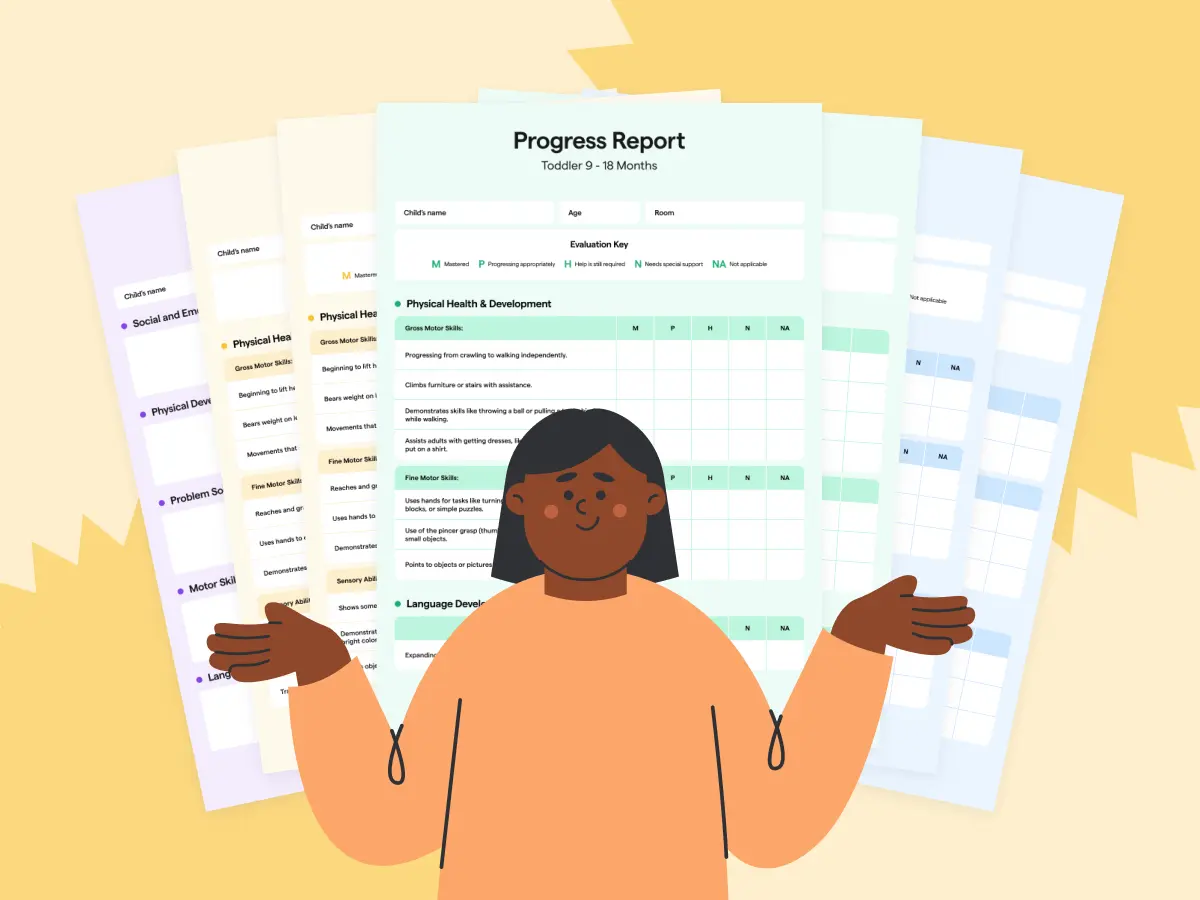settings
children
With Famly since
7 (!) free downloadable and editable preschool progress report templates.
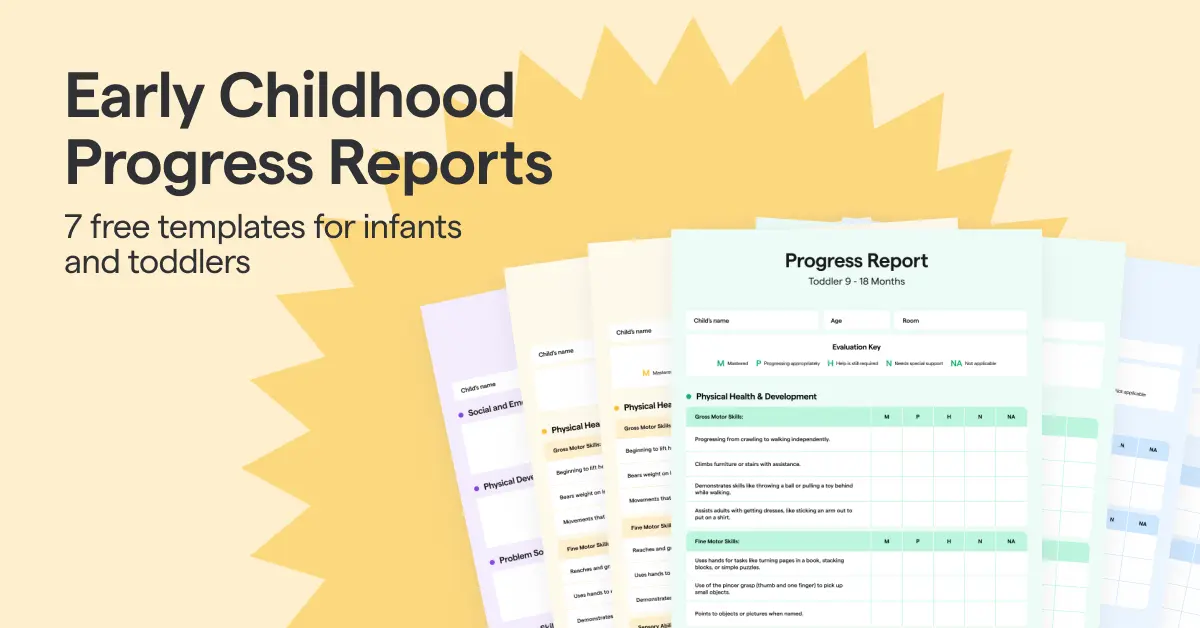
Families and educators share a common goal: to support and nurture their children into confident, curious, capable and unique individuals. And one of the important tools in early childhood growth and development is the preschool or daycare progress report.
What is a preschool progress report?
A preschool progress report is a detailed account of a child's development progress in various domains - cognitive, social, emotional, and physical growth. They provide a comprehensive picture of a child's strengths, areas for improvement, and milestones achieved within a specific period.
Unlike the traditional report cards we received in our school days, progress reports in early childhood education (ECE) are more narrative and observational. In other words, I am not talking about giving letter grades in their early years. But instead, simply observing and tracking their learning journey and process - from showing signs of trying to stand up themselves, to sharing their toys without screaming or crying, to learning how to count to ten.
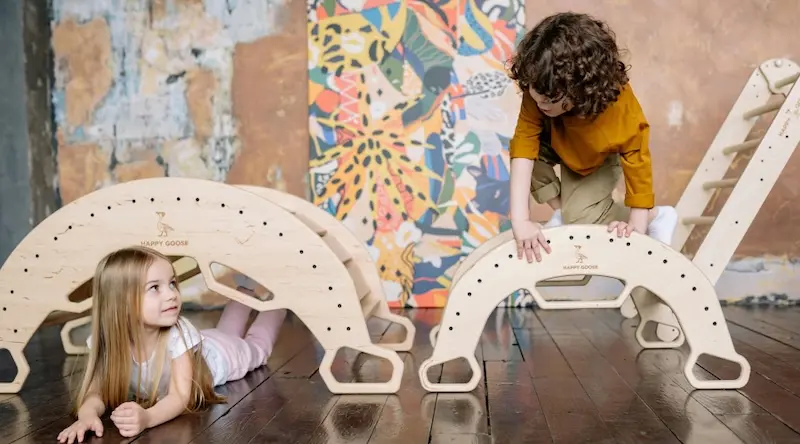
Why is a daycare progress report so important?
Let’s dive into the purposes and benefits of early childhood progress reports.
Focus on the individual as a whole
Preschool progress reports support a holistic view of a child's development. Instead of focusing solely on academic achievements - or what you think of when you imagine a traditional report card - they touch on a broad range of developmental areas.
From motor skills, social skills, emotional development, creativity, problem solving and physical development to so much more. This ensures that all aspects of each unique child are nurtured and encouraged to flourish.
Recognize and celebrate development and growth
By observing and tracking a child’s developmental progress - from picking up a crayon to going down the playground slide alone - teachers and families are given an informative summary of their growth over time.
But more than just being informational, preschool progress reports offer a place to celebrate achievements. And no matter how small, acknowledging and celebrating is essential in building a child's confidence and self-esteem, and encouraging a love for learning.
Identifying each child’s needs
Of course, specific milestones typically occur at certain ages, but a children’s developmental pace can vary significantly, and it is important to refrain from comparing children.
Daycare progress reports enable ECE staff and families to really understand each child’s unique strengths, interests and areas that require a bit more support. This is beneficial for planning future learning activities and setting developmental goals.
Progress reports in ECE enable educators to tailor their teaching methods and activities to suit individual needs. This personalized approach ensures that each child receives the attention and resources they need to thrive.
For example, does Emily love to sing songs, but is struggling to pay attention to one activity at a time when she is playing alone? Maybe you can find a toy that incorporates music with it. Or maybe, when it is time to learn how to count to 10, teaching her a song to sing will help.
The big ideas
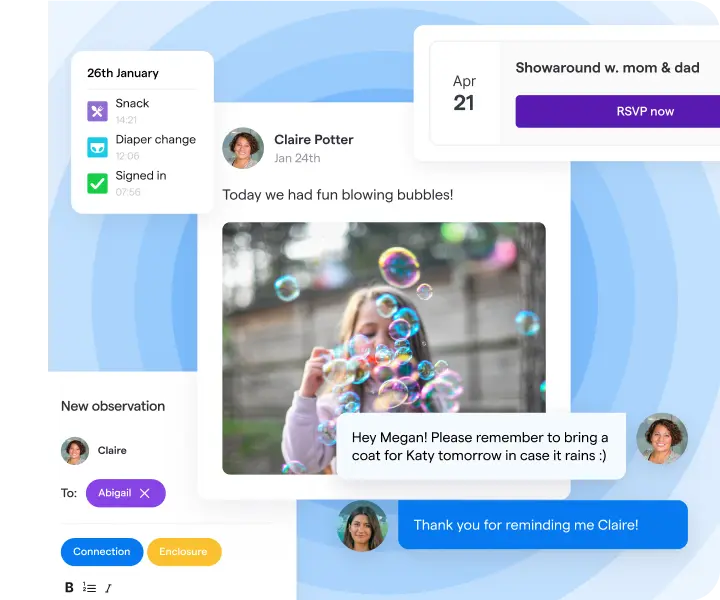
Set realistic goals
Preschool progress reports can help with personalized lesson planning. But more importantly, it sets realistic expectations of, and goals for, each child’s development across a variety of areas.
By understanding how a child is developing in each area, educators can set specific, measurable, attainable, relevant, and time-bound (SMART) goals. Clear goals and action plans provide direction and ensure everyone is on the same page.
These SMART goals should be incorporated into each child’s preschool progress report, with a clear outline of what steps will be taken to support the child's development and how families can contribute at home.
Also, as you document progress reports over time, it will be easy to see whether goals were achieved, or whether the goals that you thought were attainable actually were not. Again, this is really beneficial in helping individualize learning journeys and activities to each child. And also as mentioned above, when children achieve different goals they are able to build their self-confidence and independence.
Additional support when needed
Identifying potential developmental delays or challenges early on is essential. (But again, remember that development is individualized and not every delay should be considered a problem or issue that needs fixing).
However, when a child is truly struggling, daycare progress reports can identify which areas additional support is needed. This allows ECE staff and families to provide the necessary resources and strategies to help.
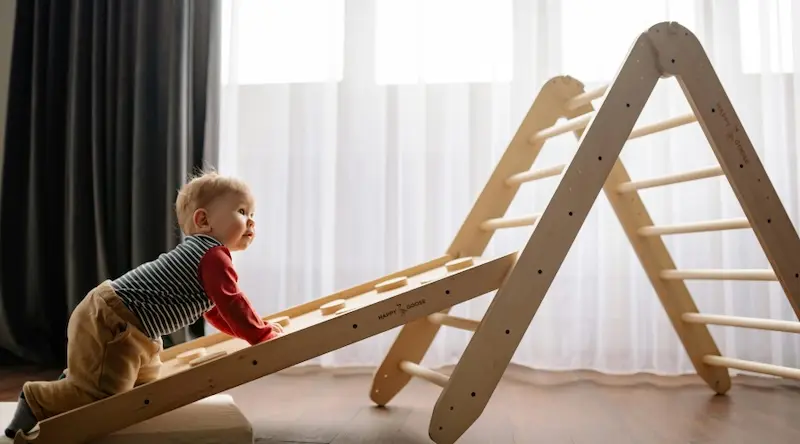
Strengthen teacher and parent partnerships
Frequent communication between families and ECE staff is vital for a child's successful development. Preschool progress reports are one way to foster that partnership by providing a structured way to share observations and insights. When parents are actively engaged in their child's education, it creates a collaborative environment that benefits the child's overall development.
Daycare progress reports encourage family engagement and involvement by keeping them informed about their child's progress and areas where they can provide support at home. A child’s home and childcare center should not feel like two distinct environments to a child, but rather should feel like they complement each other and build off of one another.
They are also helpful frameworks for conversations, like parent-teacher conferences.
Build a strong foundation for future learning
Preschool is children’s first “formal” introduction to education and learning. Therefore, early childhood education can have a big influence on a child's future academic and social success. Their experience in the classroom, with their teacher, with activities and peers will influence their excitement and eagerness to learn.
By using progress reports to monitor and support development, educators and families can ensure that children build a strong foundation of skills and knowledge, and also a positive learning experience, so children can continue to thrive in their education journey.

How to create effective progress reports?
- Detailed observations: Take detailed notes on each child's activities and behaviors. Observations should be specific and based on concrete examples. For instance, instead of saying "Jane is good at art," you could note "Jane demonstrated fine motor skills by carefully coloring within the lines and using a variety of colors in her artwork."
- Clear and simple language: Preschool progress reports should be easy for families to understand. Avoid educational jargon and use clear, simple language. This ensures that teachers and families will be on the same page to support their child's development.
- A balance of strengths and areas for improvement: A balanced approach is crucial. Don’t just spend too much time focusing on the areas for improvement. Highlight the child's strengths and achievements while also noting areas that need improvement. This provides a complete picture and helps parents and educators work together to support the child's growth.
- Use examples: Include photos or samples of the child's work to support your written observations and report. If there is nothing tangible, being able to talk about specific instances or activities is also recommended. These examples provide tangible evidence of the child's progress and make the report more engaging, understandable and meaningful.
Your personal writing assistant
Fix spelling, grammar, and improve the tone of every message and newsfeed post. All with Sidekick.
Learn how Sidekick works




